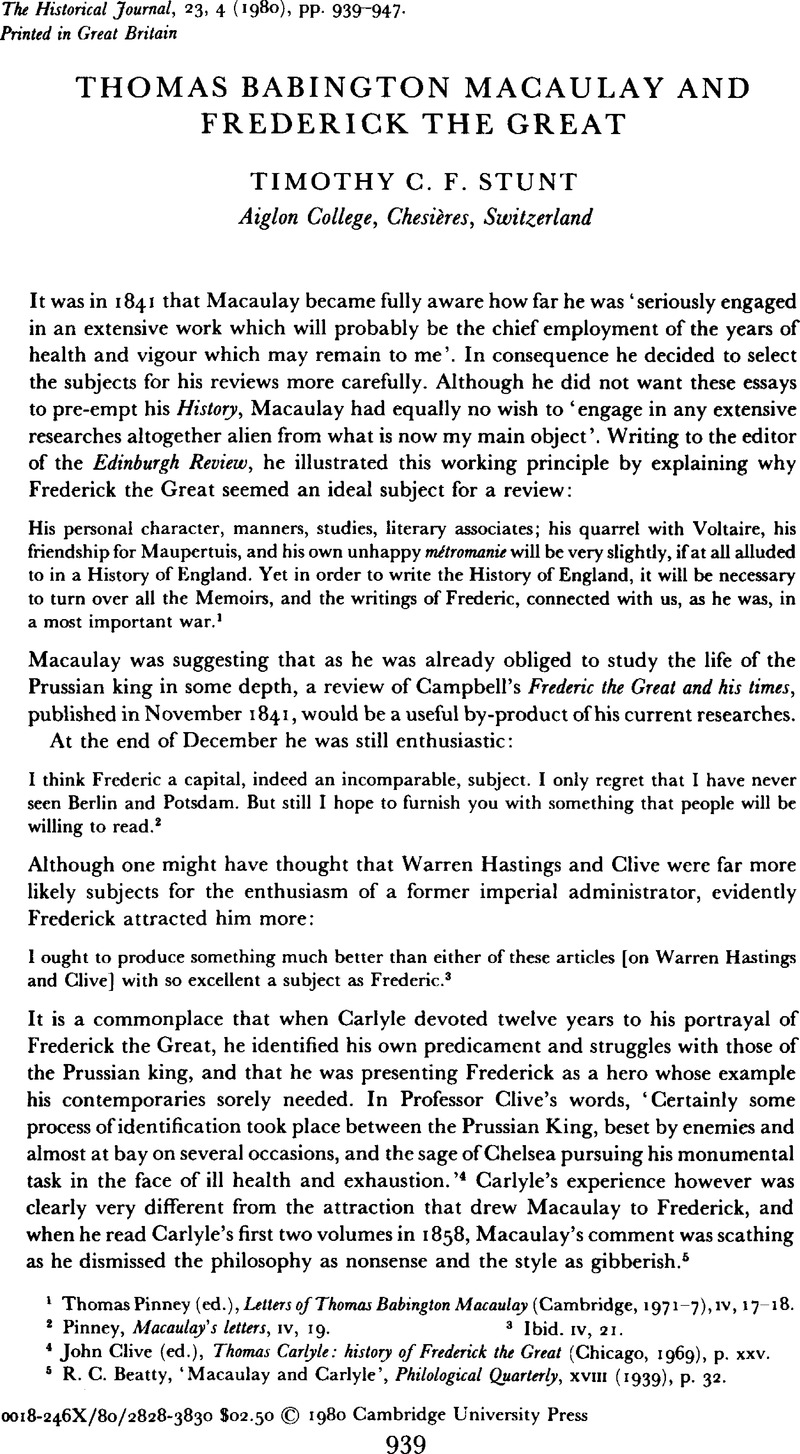No CrossRef data available.
Article contents
Thomas Babington Macaulay and Frederick the Great
Published online by Cambridge University Press: 11 February 2009
Abstract

- Type
- Communications
- Information
- Copyright
- Copyright © Cambridge University Press 1980
References
1 Pinney, Thomas (ed.), Letters of Thomas Babington Macaulay (Cambridge, 1971–1917), IV, 17–18Google Scholar.
2 Pinney, , Macaulay's letters, IV, 19Google Scholar.
3 Ibid. IV, 21.
4 Clive, John (ed.), Thomas Carlyle: history of Frederick the Great (Chicago, 1969), p. XXVGoogle Scholar.
5 Beatty, R. C., ‘Macaulay and Carlyle’, Philological Quarterly, XVIII (1939), p. 32Google Scholar.
6 I.c. Young, G. M. (ed.), Macaulay: prose and poetry (London, 1952)Google Scholar; Trevor-Roper, H. (ed.), Macaulay: critical and historical essays, (London, 1965)Google Scholar; Clive, J. and Pinney, T. (eds.), Selected writings of Thomas Babington Macaulay (Chicago, 1972)Google Scholar.
7 Atkinson, C. T. (ed.), Lord Macaulay: Frederic the Great (Oxford, 1914), p. ivGoogle Scholar. Other editions were Davis, H. W. C. (ed.), Lord Macaulay: essay on Frederic the Great (London, 1909)Google Scholar; Salmon, D. (ed.), Macaulay's essay on Frederic the Great (London, 1913)Google Scholar.
8 ‘Frederic the Great’ (Apr. 1842) in Macaulay, Lord, Essays and lays of ancient Rome (London 1890, popular edn), p. 807Google Scholar. Frederic's tolerance is confirmed by Hubatsch, Walther, Frederick the Great of Prussia: absolutism and administration (London, 1975), p. 40Google Scholar. John Clive's most recent assessment of Macaulay confirms that Frederick's maintenance of a ‘free press’ was an important aspect of Macaulay's approval. In ‘Why read the great 19th-century historians?’ he argues that Macaulay's distinctive interest both in his History and in his political life was with the ‘public mind’ and ‘public opinion’. The American Scholar, XLVIII, I (1978–1979), 42–8Google Scholar.
9 Macaulay, , Essays, p. 807Google Scholar.
10 Ibid. p. 808.
11 Trevelyan, George Otto, The life and letters of Lord Macaulay (London, 1890, popular edn), p. 392Google Scholar.
12 Ibid. pp. 399–400.
13 Clive, and Pinney, , Macaulay's selected writings, p. xxiiiGoogle Scholar.
14 Macaulay, , Essays, p. 801Google Scholar.
15 Ibid. p. 818.
16 Davis, , Macaulay's Frederic, p. viiiGoogle Scholar.
17 Macaulay's, Essays, p. 827Google Scholar.
18 Trevelyan, , Macaulay, pp. 396–7Google Scholar.
19 Pinney, , Macaulay's letters, IV, 22Google Scholar.
20 ‘Nature.… had withheld from him those higher and rarer gifts without which industry labours in vain to produce immortal eloquence and song.’ Macaulay, , Essays, p. 796Google Scholar.
21 Pinney, , Macaulay's letters, II, 155Google Scholar.
22 Ibid. IV, 44.
23 Trevelyan, , Macaulay, p. 426Google Scholar.
24 Pinney, , Macaulay's letters, IV, 22, 24Google Scholar.
25 Macaulay, , Essays, p. 823Google Scholar.
26 Trevelyan, , Macaulay, p. 474Google Scholar.
27 Dictionary of national biography, XII, 415, 418.
28 Macaulay, , Essays, p. 794Google Scholar. Cf. ‘His statements of faith gradually became ambiguous and calculated, as he made them into a weapon of his opposition a telling weapon, since it was aimed at his father's conscience and religious scruples.’ Hinrichs, Carl, ‘The conflict between Frederick and his father’, in Paret, Peter (ed.), Frederick the Great: a profile (New York, 1972), p. 11Google Scholar.
29 Bufano, Randolph J. (ed.), ‘An unpublished memoir of Lord Macaulay’, Notes and Queries, n.s. XXV (06 1978), 241Google Scholar.
30 Clive, John, Thomas Babington Macaulay, the shaping of the historian (London, 1973), p. 54Google Scholar.
31 Trevelyan, , Macaulay, p. 98Google Scholar. ‘He could always be propitiated by a present of a grenadier of six feet four or six feet five; and such presents were from time to time judiciously offered by his son.’ Macaulay, , Essays, p. 797Google Scholar.
32 Clive, , Macaulay, p. 499Google Scholar.
33 Macaulay, , Essays, pp. 793, 829Google Scholar.
34 Simon, Edith, The making of Frederick the Great (London, 1963), p. 46Google Scholar.
35 Ritter, Gerhard, Frederick the Great: an historical profile (London, 1968), p. IIIGoogle Scholar.
36 Gooch, G. P., Frederick the Great, the ruler, the writer, the man (London, 1947), pp. 233–4Google Scholar.
37 Pinney, , Macaulay's letters, 11, 148Google Scholar.
38 Carlyle, Thomas, History of Friedrich II of Prussia (London n.d.), VI, book 19, ch. 1, p. 5Google Scholar.
39 Clive, , Carlyle's Frederick, p. xxxivGoogle Scholar.
40 Millgate, Jane, Macaulay (London, 1973), p. 97Google Scholar.
41 Clive, and Pinney, , Macaulay's selected writings, p. XVGoogle Scholar.


